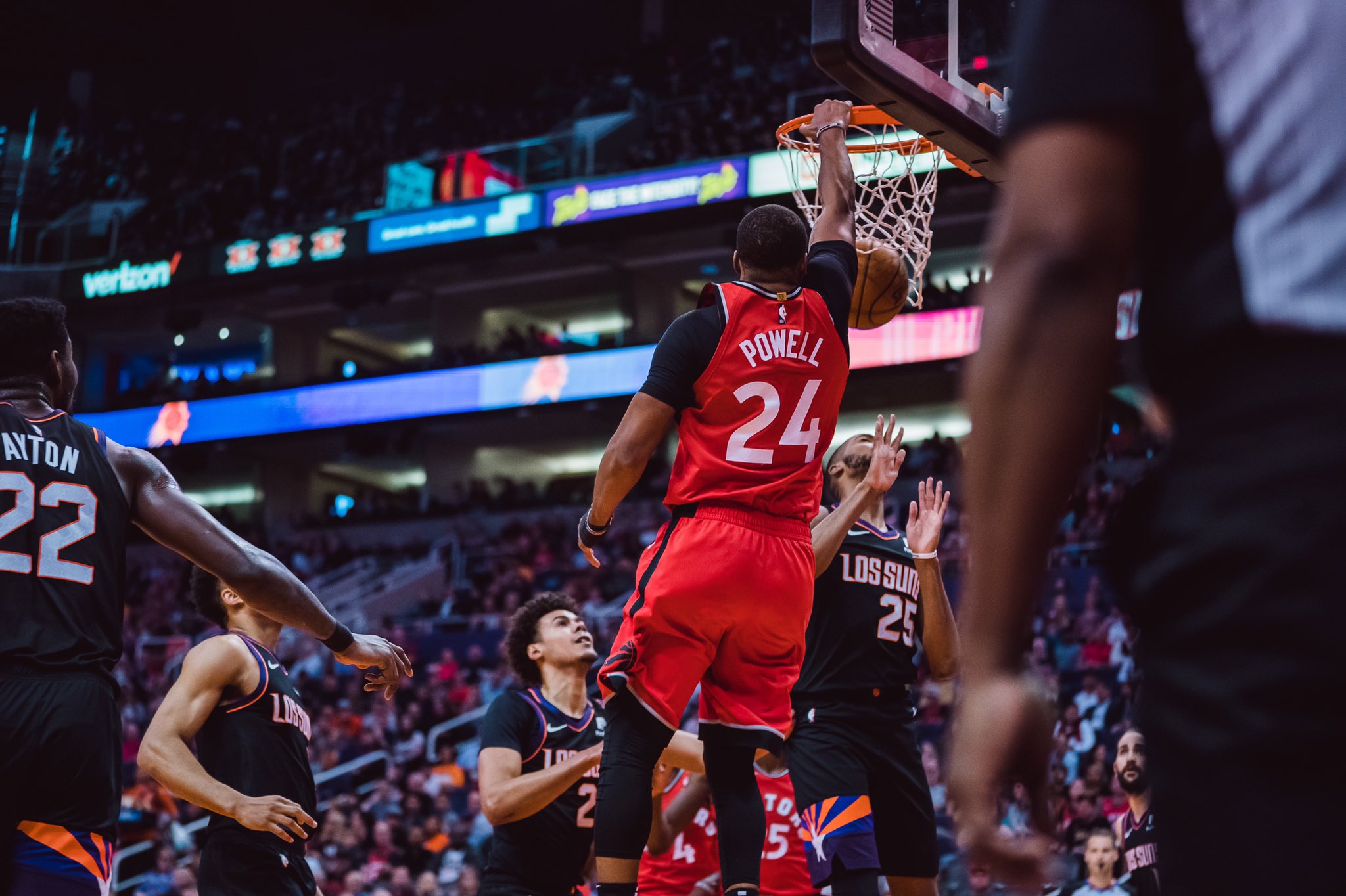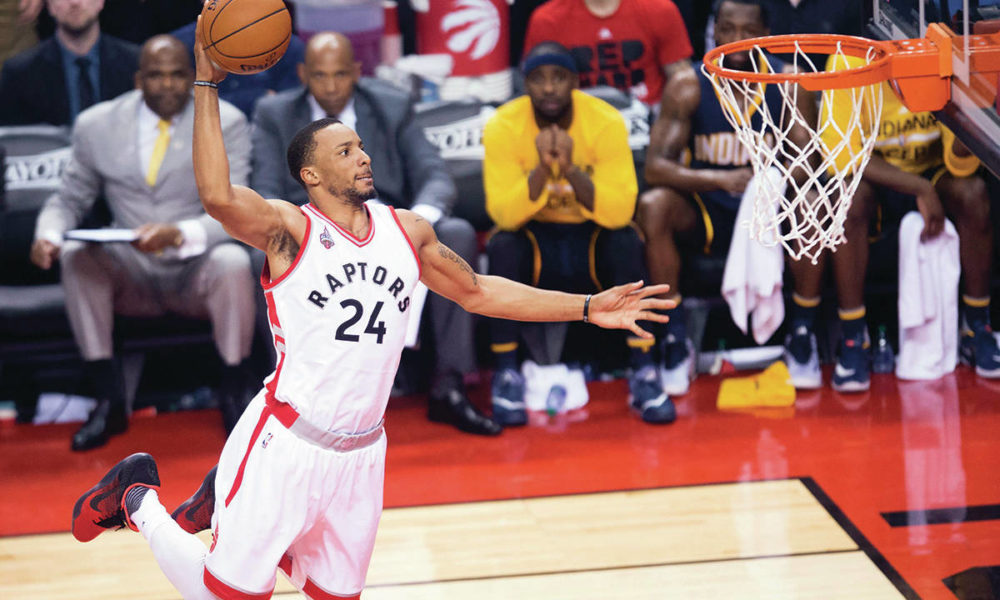To begin the second quarter between the Toronto Raptors and Golden State Warriors, a small dusting of magic found its way onto the court. Norman Powell started playing basketball as well as any human being possibly can. The Warriors had closed the gap to a single possession.
Enter Powell.
He stole the ball and earned free throws, making both. He took a hard dribble in from the wing and hit a pull-up jumper. He stepped around a screen and pulled up for a triple, then drove, euro-stepped, and stretched out his pterodactyl arm for a tough lefty layup. Another triple coming around a screen. Then another deep bomb from the corner with a defender as close as thermodynamic laws allow.
All in all, Powell scored 15 points in a few minutes. It was hypnotic, watching him erupt and explode and just keep going. Most importantly, he pushed Toronto’s lead from three points to 14. It was a scoring spree of monumental proportions, but perhaps even more impressive than its occurrence was that it didn’t really make waves. There has been little attention, relatively, from Toronto media, let alone from national writers. 15 points in four minutes, not missing a single shot. He finished with 37 points, a career high. That’s unbelievable. Believe it. This is just who Powell is at this point.
It was on November 18 that Nick Nurse questioned Powell’s consistency to assembled media.
“You don’t expect him to do it every night, 20+ [points] every night, but maybe we could get it maybe one out of four, we could be at one out of three,” Nurse said then.
Since then, Powell practically has given 20 points every night. He’s averaged 19.2 points per game while shooting 51.9 percent from the field, 41.4 percent from deep, and 84.2 percent from the line. He’s done that despite two long, sustained injuries that kept him out of 20 of Toronto’s 51 games. But it hasn’t slowed Powell at all. Since returning most recently from a finger injury on February 28, Powell has scored 22, 24, 26, 37, and 31 points. If he’s on a heater, it’s a long one. It may not end.
Here’s a comparison worth your while. These are arbitrary markers, designed exclusively to set Powell apart, and today’s pace certainly helps him, but this is still shocking: in history, only four other players have ever notched a season like Powell’s so far. His combination of scoring, efficiency inside and outside the arc, and proclivity to launch three-pointers have only ever been combined by Kevin Durant, Steph Curry, Mike Miller, and Karl-Anthony Towns.
Powell isn’t just putting up empty scoring stats. He is tangibly boosting Toronto’s offense. Per Cleaning the Glass, Powell’s presence boosts Toronto’s half-court scoring by 4.5 points per 100 plays, third-best on the team behind Pascal Siakam and Marc Gasol. The Raptors shoot better at the rim and behind the arc when he’s in the game.
Partially, that’s because Powell himself is such a proficient shooter and finisher. He’s been a good shooter for awhile now. His form is identical every time, and he puts more spin on the basketball than possibly any shooter alive. But no, that’s not the difference, the change that allowed this eruption. The most significant development has been his growth this year into an elite finisher, making 68 percent of his shots at the rim, comparable to a monster like LeBron James (69 percent). He no longer drives at people and figures out what he’s doing in the air; he sets up his moves well in advance, and he’s shown more touch over the last week than during the first four years of his career.
Of course, the shooting helps. He cuts beautifully off the ball, jetting around screens while keeping his balance so that he can turn and fire in no time at all. This is the definition of hunting triples. He launches high on his shots, and he’s very consistent, both shot-to-shot and game-to-game.
As a result, the way in which Powell is scoring is hugely important for Toronto. He is scoring 1.17 points per isolation possession, 93.9th percentile league-wide. He is scoring an identical rate when spotting up. He’s above average as a pick-and-roll handler, a cutter, or coming around a screen. Toronto needs trustworthy initiators who can also murder defenses off the ball. And at the moment, Powell is one of a small handful of players who can do both for the Raptors.
Think about it this way. If Toronto runs Powell around an off-ball screen and gets him the ball, there are two simple outcomes. Either he pulls up off the catch, and he’s shooting 43.0 percent from deep on such shots. Or he drives, and he’s shooting 56.3 percent on those. Either of those events would be just about as productive a possessions as Toronto can muster. It’s no wonder why Powell’s presence helps Toronto’s half-court offense.
So what can Powell become for Toronto? At this rate, Powell is Toronto’s second-best scorer, behind only Pascal Siakam. He is a more consistent shooter than Kyle Lowry and a more consistent finisher than Fred VanVleet. On a per-minute basis, Powell gets up more shots than any Raptor other than Siakam and Serge Ibaka, which is sort of the point. For the first time in Powell’s career, his role is simple and certain. He knows where his minutes and shots are coming from. He is asked only to score, and he has delivered.
Powell is Toronto’s only dependable wing scorer, and that matters. The NBA has shifted towards wing play. Guards shoot pull-ups and initiate, and bigs space or rim-run or occasionally play in the post, but wings are usually the only ones allowed to isolate and dictate the playoff offense. Think Kawhi Leonard or LeBron James. Every team needs a high-efficiency wing scorer. Powell is stepping into a role that Toronto has sometimes lacked this year.
Siakam can look much like a wing at times, but he’s still not great handling in the pick-and-roll, his jumper is inconsistent, and he’s best in the post, besides. Powell gives Toronto that explosive scorer who is not asked to facilitate for others. When Toronto faces the Milwaukee Bucks in the playoffs, who give a runway to opponents and let tertiary scorers fire away from deep, Powell could lead Toronto in points per game. If Milwaukee insists on dropping its big guarding off-ball screens, Powell could shoot 10 or more open catch-and-shoot triples a game. That, alone, would bend the physics of the series.
Players don’t usually make gigantic mid-season leaps. But 30 games is a fairly long hot streak, and besides, Powell has improved in tangible ways. He’s not just making shots that he used to miss. He’s creating better shots, and making those too. That’s a big difference. As a result, Powell is one of Toronto’s most important players. His ability to score is kind of unique across the league, at least statistically.
Let’s set some other contrived benchmarks. There is only one single player in the league this year, save Powell himself, that combines Powell’s usage, three-point volume and accuracy, and true shooting, and it’s offensive superstar center Karl-Anthony Towns. Go back in time. Only five players have ever done it over a season. Powell has spent the majority of this season being one of the best and most efficient scorers in the league. It’s hard to speak about this without being hyperbolic, but that’s because Powell’s jump is fairly unprecedented.
So has Powell suddenly become a superstar? Well, kind of. It’s a little exaggerated, especially because Powell’s passing and defense don’t live up to his scoring. But Toronto doesn’t need him to do those things at All-NBA levels to be a great team. They may need his scoring, which has suddenly become uniquely special across the NBA. And if Powell keeps scoring like this then Toronto could have one more piece in place that allows the team to chase another championship.



